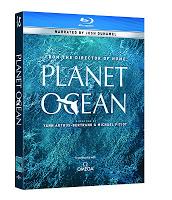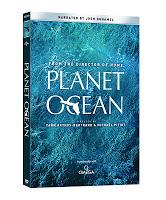 I must admit that when I was asked to review Planet Ocean, a documentary film from Universal Studios Home Entertainment, I thought it was going to be a nature film about all of the wonderful creatures that live under the sea. But though there is stunning photography of the ocean’s animal and plant life, this movie is really about conservation and preserving the ocean environment. It’s about the interdependency of humans and oceans, and how people’s actions are threatening that tenuous connection.
I must admit that when I was asked to review Planet Ocean, a documentary film from Universal Studios Home Entertainment, I thought it was going to be a nature film about all of the wonderful creatures that live under the sea. But though there is stunning photography of the ocean’s animal and plant life, this movie is really about conservation and preserving the ocean environment. It’s about the interdependency of humans and oceans, and how people’s actions are threatening that tenuous connection. Directed by photographer, filmmaker and environmentalist Yann Arthus-Bertrand, and narrated by actor Josh Duhamel, the film can be a bit heavy at times, especially at the beginning when explaining the origins of the oceans and the earth. Children younger than upper-elementary-school age may not be entertained. But it gets more fascinating as we learn about the dominant role of plankton, the importance of coral reefs, and the rise of the fishing and shipping industries. Here are some interesting things I learned from Planet Ocean*:
• Half the air we breathe comes from micro-algae in the water.
• The whale shark, the largest fish, survives by eating plankton.
• Coral, created by plankton, is the most densely populated ecosystem on our ocean planet, a “marine city.” It is also a living predator when the living part inside the skeletal outside emerges at night. It only reproduces once a year, during a spring full moon, when it releases male and female gametes, which produce larvae that disperse by currents to form new coral reefs.
• Groupers start out in life as females and then turn into males.
 • People have no predators above them. They’re at the top of the food chain and occupy the land that emerged from the sea.
• People have no predators above them. They’re at the top of the food chain and occupy the land that emerged from the sea.• Seaweed needs only 6 weeks of growth before it can be harvested. It supports 1 million sea farmers. Not all seaweed is edible, though.
• Only coral fish can survive an anemone’s poison. From an early age, they rub against the anemone to “self-immunize” themselves to the poison.
• Fishing used to be a family event, but is now an industry. Some nets are as big as 25 miles and go down more than 3000 meters. Ships use probes and radar to hunt marine life.
• Eighty percent of fish stocks are fully or overly exploited. Atlantic Bluefin Tuna is on the verge of extinction. Jellyfish populations are growing as their predators, such as Red Tuna, are dying off.
• Shanghai is the biggest port in the world. Thirty million containers are unloaded there each year. Twenty-three million people live in Shanghai.
*Errors are most likely my own.
As you can tell, this movie is packed with information about the importance of our oceans to life on earth and how it is being threatened by human activity. This would be a good movie to watch as a family or in the classroom for Earth Day on April 22. It would also be appropriate for science classes and student environmental groups. Planet Ocean is available on Blu-ray and DVD. You’ll be awed by the stunning photography and awakened by the film’s message that we must do more to preserve our oceans and its creatures before it’s too late.


This post contains my Amazon affiliate link.

